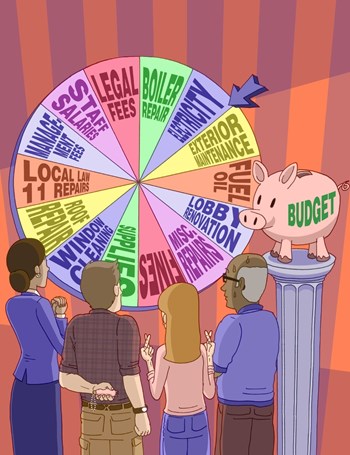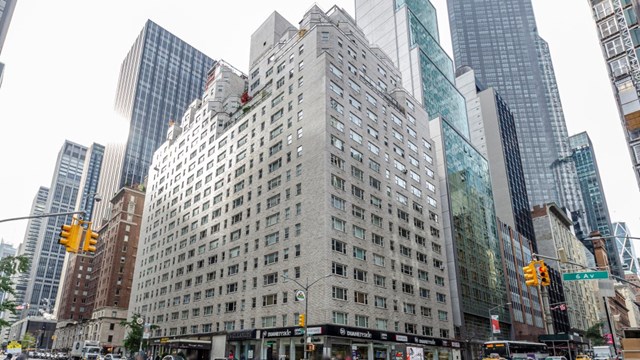
Even in the best of economic times, preparing a co-op or condo’s annual budget can be a tiresome task, fraught with uncertainty, estimations and shifting numbers. Factor in one of the most harrowing economic downturns in a century, with cash-strapped owners sometimes “skipping” their monthly maintenance fees—or even winding up in foreclosure—and you have a downright daunting task.
The Game Plan
The importance and economic challenges of this year’s annual budget are not underestimated by Martin Kera, a principal of Bren Management Corp. in Manhattan, who says, “There is no magic formula or elixir to drafting a budget, it’s more of a case by case basis. We’ve had a different experience [from other developments]. We’ve been able to collect 100 percent of maintenance charges,”says Kera, who cites that this year’s operating budget was based on the previous year’s budget in which 80 to 90 percent was fixed. “We’ve been able to negotiate for lower insurance policy costs, and union dues go up annually at a consistent rate, but electric, water, gas are going up like crazy and there’s no telling what they’ll be.”
Getting that “plan” into action is no small feat, but does follow a more or less consistent path year after year. Usually, beginning in July or August a building’s management company or treasurer will conduct the upfront preparation, analysis and initial drafting of the budget. As with most things in life, this preparation proves to be the most overwhelming—yet most important—aspect of the budget process.
By September, the first draft of the budget will be presented to the community and after an average of three meetings, a finalized budget is put to vote for approval by the end of December. From start to finish, close to half a year has been devoted to the budget process.
A clear understanding and estimating the minute details of the fixed and variable costs encompassed in the budget will assist buildings and associations in this arduous task, explains Stephen Beer of the Manhattan-based accounting firm Czarnowski & Beer.
“You really want to get an education on how these things are calculated, what your [rate of] consumption is and what your charges are,” says Beer. “Some of the better managing agents do that in their budget models.”
“Fixed Costs” No Longer Fixed
It has been estimated that about 80 percent of a condominium’s operational costs are fixed and fluctuate minimally over the course of the year. However, in this economy many of those previously fixed costs are all over the map—or up for negotiation—and require more careful research and analysis than in previous years.
The first step in the budget process is to review and compare the first eight-month billing cycle of the current year and compare that to the previous year’s budget. This will yield the average projected costs. Such items reviewed would include utilities, insurance, repairs and the like.
However, what in previous years may have been viewed as safely averaged costs (as an example, the water bill) may not be the case this year. Other utility costs, such as electricity, will prove even more difficult to average because they are dependent on other fluctuating market factors such as gas prices.
Philp Goldfarb, CPA and a partner of the Woodbury, New York-based Weisberg, Molé, Krantz & Goldfarb, LLP, and a 21-year veteran of the accounting business, has seen his share of annual budgets. He advises that cooperative and condominium developments consider the trends and known increases perhaps not reflected in the actual results of the current year’s budget.
“If it’s a union building, know that employee cost increases for the next year must be considered. They [the building] should be in contact with their oil carrier (or gas provider) to know what the current costs of energy are. [The building] should also be in touch with the city or town so any real estate tax increases are contemplated. Using actual results from the current year is an okay guide, but you can not use them in a vacuum,” says Goldfarb.
Beer acknowledges the need to gauge trends and potential cost increases as it is better to play it safe in this economy than not.
“The big one is going to be city charges which are real estate taxes and water and sewer charge.” In January 2009, the city implemented an increase retroactive from July 2008, he explains. “That’s the first time in my career that I remember hearing about this. Now the water and sewer charges have been increasing by double digits year after year. Those are the two hot areas that have been really going up significantly.”
Repair costs are more of a moving target and can fluctuate yearly. Some years experience an unexpected onslaught of repair thanks to ice storms, flooding, or a catastrophic accident such as a fire. These variables make calculating an accurate projected cost challenging. However, reoccurring data is fairly predictable, and most experts advise reviewing the repairs completed in the previous year and consulting the building’s super as to what repairs are foreseen in the future.
Repairs are not the only unexpected costs caused by bad weather or winter storms. Some condominium communities have to absorb increases in insurance premiums due to claims filed as a result of storm damage. Associations will need to contact their insurance agents to get an accurate assessment of what increases—if any—to expect.
Contract work and capital improvement projects are definitely a “cash flow issue,” says Beer, adding that “working capital if you have the money.”
“As long as your deferral is not going to increase your cost, and cosmetically it’s not going to reduce the owner’s value or their ability to sell apartment, you can defer. But when you defer you end up bunching up projects that come on later, and you wind up going through a longer term program. We see it in buildings. It takes them five to ten years to recover from a deferral. So if you can’t do it, then you can’t do it but it’s best if you can.”
Other cost savings can be found in discretionary maintenance costs. If the building is normally well-maintained, then forgoing work on purely cosmetic projects for now won’t have disastrous consequences, and will help lower budget costs.
“What you have to consider is that budgeting at this time is focusing on what do you have to spend money on, and what can you defer or put off. Particularly in the area of repairs or capital improvements [consider] what is absolutely necessary as opposed to what can wait a year or to,” says Gerald Marsden, CPA and a partner at Manhattan-based Eisner & Lubin, LLP. “So your thinking has to change, and you have to focus on prioritizing. The priority has to be—depending on a particular building and how dire finances might be—the criteria for deferral and it will be different. But if you are in bad shape—unless it’s absolutely necessary—you’re going to try to put it off if possible.”
Delinquencies Rising
Many co-op and condo residents, hard hit by the economy, are finding it more and more challenging to make their monthly maintenance and common charge payments. In this year alone, Marsden has seen a “slowdown” in timely payments.
“We’ve seen some people paying later, but not so much where people were not paying. In many buildings instead of paying on the first of the month, people paid on the 15th, the 20th, etc.”
Carl M. Cesarano, a partner with Cesarano & Khan, CPA’s, PC in Floral Park, understands the concern of a possible decrease in operating reserves.
“The general economic situation—which is creating record unemployment—also raises the concern of increased default risk, or the risk that unit owner common charges or shareholder maintenance arrears will increase dramatically (we are already seeing a increase in arrears with our clients). In the case of co-ops, the co-op corporation has a first lien on the shares owned by shareholders’ for indebtedness arising under the provisions of the proprietary lease. The defaults will still create cash flow problems, as the co-op’s bills still need to be paid on time, while legal issues are sorted out. For condominium associations, unit owner defaults can have a devastating impact on operations, as day-to-day bills will have to be subsidized by reserves or increases in common charges.”
Some communities have had to raise maintenance fees and common charges to cover the costs of negligent owners. Beer feels strongly that severe deficients unfortunately leave little option other than increases in fees and charges. “There’s only three places the money can come from: the unit owners, the unit owners and the unit owners. So the other ones have to pay, and sometimes in these smaller condos everybody has to ante up for the person that can’t pay. If you don’t have the money, then it’s an assessment. You can borrow from reserves to some extent, but really there is no magic formula to make money or bring money in except to tell people that they have to pay more. There are little things you can do, but really nothing big.”
The answer may lie in proper budgeting. Marsden suggests proper planning and maintaining adequate reserves to cover the cost of unforeseen circumstances.
“You have to plan. What happens is that people wait for things to get bad before they take an action. You have to have a plan toward your spending policies, and you always have to have reserve cash available. You should have reserves sitting and cash that will hold you in case there are problems. A co-op should always be sitting with the ability to borrow a line of credit. In case an emergency arises, they can go to the bank and have a loan to get them through the problem.”
Reserve Funds “Dipping”
Predicted apartment foreclosures have caused lenders to heighten their scrutiny of a building or condo association’s financials before giving approval for a loan. Of particular interest is a building’s reserve fund.
The reserve fund is set up to provide for capital improvements, major repairs and maintenance issues not covered by the regular operating budget. Even with the typically conservative vehicles co-op and condo communities traditionally invest in (such as CDs or government securities), reserve funds might be seeing a “dip” in value. This dip may impact future mortgage approvals, as many financial institutions are becoming more stringent with requiring buildings to maintain their reserve funds at a specific percentage of the building or association’s overall budget.
Both Fannie Mae and Freddie Mac have had such a requirement in place for several years. Both require 10 percent of a condo association’s budget to be earmarked for the reserve fund. The purpose is not only to protect the lender’s investment, but also the buyer.
“The intent is to ensure the project’s long-term success,” explains Brad German, senior director of public relations for Freddie Mac. “As you know, when [buildings] or HOAs begin experiencing financial stress, reserves are often reduced. This in turn can affect the overall project’s condition, its ability to maintain adequate insurance coverage and ultimately the market value of the individual units.”
Amy Bonitatibus, senior media relations manager for Fannie Mae, agrees. “This [requirement] is intended to ensure that a building is well managed and that prospective buyers will not be faced with unanticipated financial hardships like special assessments or large increases in fees due to thelackof an adequate reservefundingstrategy.” She also notes that in some cases, the requirement can be waived if it is determined that an association is still able to fully operate withless than 10 percent reserves built into the budget.
With reserve funds playing a part in everything from mortgage approvals to fee increases, it is important for buildings and associations to adequately maintain their fund—but equally important to have a realistic plan in place for its use. This is where a reserve analysis study comes into play.
In its simplest terms, a reserve analysis study is a physical checkup of the building and grounds.
“Reserve analysis are in two parts: the normal operating analysis and your repair and improvement analysis. It’s essential, it’s like running a business and not knowing what your sales plan is for the next five years,” says Marsden.
Typically, the study reports the life expectancy and when repairs will most likely need to be made on “big ticket” items such as the roof or boiler. Most studies project out 20 to 30 years.
“Every building should have knowledge of what work they are going to need in the next five or ten years, in a loosely adapted plan, to fund the work that they need to do,” says Beer . “We normally recommend it being a five year concept. You have a plan for the next ten years, and look at it in the five year mark. You look at what’s been accomplished and needs to be done now for the next 10 years. Then you’ll have that overlap so you’re not getting squeezed.”
Having this plan will assist boards with future budgets and the budget at hand.
Drafting a budget in uncertain times is no easy task and nailing down the financial moving targets that this year’s economic landscape is presenting can have condominium managers and board members biting their nails.
But ultimately the creation of a sound annual budget can prove to be the difference between fiscal stability or a sink-or-swim scenario for many associations. Having a solid financial plan in place will also allow condominiums to build a firm foundation, for this year and years to come.
Hillary Pember is a freelance writer living in Massachusetts.






Leave a Comment